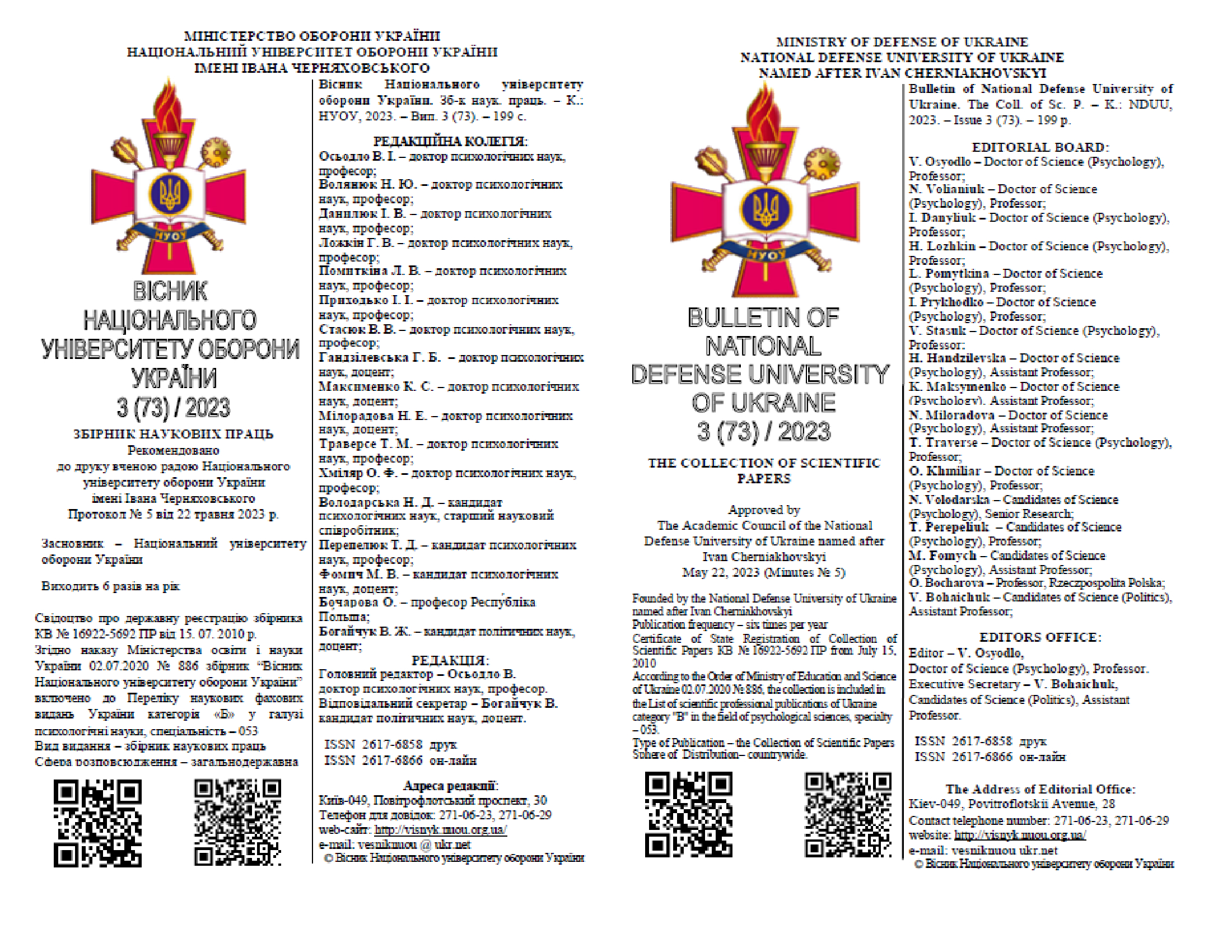МОТИВИ ПРОФЕСІЙНОЇ ДІЯЛЬНОСТІ ПОЛІТИЧНИХ ЛІДЕРІВ/КЕРІВНИКІВ
DOI:
https://doi.org/10.33099/2617-6858-2023-73-3-149-157Ключові слова:
політична професійна діяльність, політичний лідер/керівник, мотиви політичної професійної діяльності, мотив влади, мотив досягнення, мотив афіліації, контент-аналіз.Анотація
У статті проаналізовано результати емпіричного дослідження мотивів професійної діяльності політиків, а саме: виокремлено й оцінено мотиви, їх кількісну взаємодію в промовах політичних áкторів; виявлено привабливий мотиваційний профіль політичного áктора для українського суспільства під час виборів 2014 та 2019 років; проаналізовано те, як саме пріоритетність того чи іншого мотиву впливає на політичну діяльність та політичну поведінку політичного áктора.
Завантаження
Посилання
Traverse T. (2015). Psykholohichne vyvchennia profesiinoi politychnoi diialnosti áktora . Psykholohiia politychnoho myslennia. [Psychological study of professional political activity of an actor. Psychology of political thinking] Kyiv, Parlamentske vydavnytstvo, 26–42 (in Ukrainian).
Traverse T. M. (2013). Politychna psykholohiia [Political psychology]: navch. posib. Kyiv, Parlamentske vydavnytstvo, 240. (in Ukrainian).
Barber, J. D. (1980). The pulse of politics: Electing presidents in the media age. New York: Norton. (in USA).
Erikson, E.H. (1969). Gandhi's Truth. New York: W.W. Norton. (in USA).
Freud, S. (1964). Why war? In J. Strachey (Ed.), The standard edition of the complete psychological works of Sigmund Freud (Vol. 22, pp. 203–215). London, UK: Hogarth. (Original work published 1933) (in UK).
George, A.L. (1969). The «operational code»: a neglected approach to the study of political leaders and decisionmaking. International Studies Quarterly, 13, 190–222. (in USA).
George, A.L., & George, J.L. (1956). Woodrow Wilson and Colonel House. New York: John Day. (in USA).
House, R. J., Spangler, W. D., & Woycke, J. (1991). Personality and charisma in the U.S. presidency: A psychological theory of leader effectiveness. Administrative Science Quarterly, 36, 34–396. (in USA).
Langner, C., & Winter, D. G. (2001). The motivational basis of compromise and concessions: Archival and experimental studies. Journal of Personality and Social Psychology, 81, 711–727. (in USA).
Mason, A., & Blankenship, V. (1987). Power and affiliation motivation, stress, and abuse in intimate relationships. Journal of Personality and Social Psychology, 52(1), 203–210. (in USA). https://doi.org/10.1037/0022-3514.52.1.203
McAdams, D. P. (1982). Intimacy motivation. In A. J. Stewart (Ed.), Motivation and society San Francisco: Jossey-Bass. (in USA).
McClelland, D. C. (1961). The achieving society Princeton, NJ: Van Nostrand.
McClelland, D. C. (1989). Motivational factors in health and disease. American Psychologist, 44, 675– 683. (in USA).
McClelland, D.C. (1965). Toward a theory of motive acquisition. American Psychologist, 20, 321–333. (in USA).
McClelland, D.C. (1975). Power: The Inner Experience. New York: Irvington. (in USA).
Murray, H.A. (1938). Explorations in Personality. New York: Oxford University Press. (in USA).
Smith, A. G. (2008). The implicit motives of terrorist groups: How the needs for affiliation and power translate into death and destruction. Political Psychology, 29(1), 55–75. (in USA). https://doi.org/10.1111/j.1467-9221.2007.00612.x
Smith, A. G., Suedfeld, P., Conway, L. G. III, & Winter, D. G. (2008). The language of violence: Distinguishing terrorist from non-terrorist groups using thematic content analysis. Dynamics of Asymmetric Conflict, 1, 1425–163. (in USA).
Stogdill, R. M. (1974). Handbook of leadership: A survey of theory and research. Free Press.
Stone, W. F., & Schaffner, P. E. (1988). The psychology of politics (2nd ed.) (Р. 102). Springer-Verlag Publishing. (in USA). https://doi.org/10.1007/978-1-4612-3830-0
Stouffer, S. A., Suchman, E. A., Devinney, L. C., Star, S. A., & Williams, R. M., Jr. (1949). The American soldier: Adjustment during army life. (Studies in social psychology in World War II). Princeton Univ. Press. (in USA).
Williams, R. M. (1989). The American soldier: An assessment, several wars later. Public Opinion Quarterly, 53, 160–166. (in USA).
Winter, D. G. (1973). The power motive. New York: Free Press. (in USA).
Winter, D. G. (1983). Development of an integrated system for scoring motives in verbal running text. Unpublished manuscript, Wesleyan University, Middletown, CT. (in USA).
Winter, D. G. (2010). Why achievement motivation predicts success in business but failure in politics: The importance of personal control. Journal of Personality, 78(6), 1637–1668. (in USA).
Winter, D. G. (2011). Scoring motive imagery in documents from four Middle East opposition groups. Dynamics of Asymmetric Conflict, 4, 144 –154. (in USA).
Winter, D. G. (2016). Taming power: Generative historical consciousness. American Psychologist, 71(3), 160–174. (in USA). https://doi.org/10.1037/a0039312
Winter, D. G., & Stewart, A. J. (1977). Content analysis as a method of studying political leaders. In M. G. Hermann (Ed.), A psychological examination of political leaders (Р. 275–6 I). New York: Free Press. (in USA).
Winter, D. G., & Stewart, A. J. (1978). Power motivation. In H. London & J. Exner (Eds.), Dimensions of personality (Р. 3915–447). New York: Wiley. (in USA).
Zurbriggen, E. L. (2000). Social motives and cognitive power-sex associations: Predictors of aggressive sexual behavior. Journal of Personality and Social Psychology, 78, 559–581. (in USA).
##submission.downloads##
Опубліковано
Як цитувати
Номер
Розділ
Ліцензія
Авторське право (c) 2023 Вісник Національного університету оборони України

Ця робота ліцензується відповідно до Creative Commons Attribution-NonCommercial-ShareAlike 4.0 International License.





